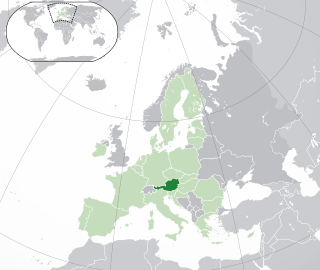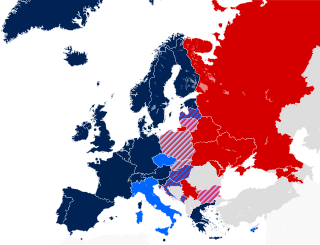Same-sex marriage, also known as gay marriage, is the marriage of two people of the same legal sex. As of 2023, marriage between same-sex couples is legally performed and recognized in 34 countries, constituting some 1.35 billion people, with the most recent being Andorra.
Civil partnership in the United Kingdom is a form of civil union between couples open to both same-sex couples and opposite-sex couples. It was introduced via the Civil Partnership Act 2004 by the Labour government. The Act initially permitted only same-sex couples to form civil partnerships, but the law was expanded to include opposite-sex couples in 2019.
Same-sex marriage in Ireland has been legal since 16 November 2015. A referendum on 22 May 2015 amended the Constitution of Ireland to provide that marriage is recognised irrespective of the sex of the partners. The measure was signed into law by the President of Ireland, Michael D. Higgins, as the Thirty-fourth Amendment of the Constitution of Ireland on 29 August 2015. The Marriage Act 2015, passed by the Oireachtas on 22 October 2015 and signed into law by the Presidential Commission on 29 October 2015, gave legislative effect to the amendment. Same-sex marriages in the Republic of Ireland began being recognised from 16 November 2015, and the first marriage ceremonies of same-sex couples in Ireland occurred the following day.
Same-sex marriage is legal in all parts of the United Kingdom. As marriage is a devolved legislative matter, different parts of the UK legalised at different times; it has been recognised and performed in England and Wales since March 2014, in Scotland since December 2014, and in Northern Ireland since January 2020. Civil partnerships, which offer most, but not all, of the rights and benefits of marriage, have been recognised since 2005.
Same-sex marriage in Denmark has been legal since 15 June 2012. A bill for the legalization of same-sex marriages was introduced by the Thorning-Schmidt I Cabinet, and approved by the Folketing on 7 June 2012. It received royal assent by Queen Margrethe II on 12 June and took effect three days later. Denmark was the eleventh country in the world to legalize same-sex marriage. It was the first country in the world to enact registered partnerships, which provided same-sex couples with almost all of the rights and benefits of marriage, in 1989.

Lesbian, gay, bisexual, and transgender (LGBT) rights in Austria have advanced significantly in the 21st century. Both male and female same-sex sexual activity are legal in Austria. Registered partnerships were introduced in 2010, giving same-sex couples some of the rights of marriage. Stepchild adoption was legalised in 2013, while full joint adoption was legalised by the Constitutional Court of Austria in January 2015. On 5 December 2017, the Austrian Constitutional Court decided to legalise same-sex marriage, and the ruling went into effect on 1 January 2019.
This article contains a timeline of significant events regarding same-sex marriage and legal recognition of same-sex couples worldwide. It begins with the history of same-sex unions during ancient times, which consisted of unions ranging from informal and temporary relationships to highly ritualized unions, and continues to modern-day state-recognized same-sex marriage. Events concerning same-sex marriages becoming legal in a country or in a country's state are listed in bold.
Same-sex marriage in New Zealand has been legal since 19 August 2013. A bill for legalisation was passed by the House of Representatives on 17 April 2013 by 77 votes to 44 and received royal assent on 19 April. It entered into force on 19 August, to allow time for the Department of Internal Affairs to make the necessary changes for marriage licensing and related documentation. New Zealand became the first country in Oceania, the fourth in the Southern Hemisphere, and the fifteenth overall to allow same-sex couples to marry. Civil unions have also been available for both same-sex and opposite-sex couples since 2005.
This is a history of same-sex unions in cultures around the world. Various types of same-sex unions have existed, ranging from informal, unsanctioned, and temporary relationships to highly ritualized unions that have included marriage. State-recognized same-sex unions have recently become more widely accepted, with various countries recognizing same-sex marriages or other types of unions. A celebrated achievement in LGBT history occurred when Queen Beatrix signed a law making Netherlands the first country to legalize same-sex marriage.
The legal status of same-sex marriage has changed in recent years in numerous jurisdictions around the world. The current trends and consensus of political authorities and religions throughout the world are summarized in this article.
Same-sex marriage in Austria has been legal since 1 January 2019. On 4 December 2017, the Constitutional Court ruled that the non-discrimination and equality provisions of the Constitution of Austria guarantee same-sex couples the right to marry. The decision took effect on 1 January 2019, making Austria the second country in Central Europe to legalise same-sex marriage after Germany, the 16th in Europe, and the 25th worldwide. Austria has also recognised same-sex registered partnerships since 1 January 2010, providing several, but not all, of the rights, benefits, obligations and responsibilities of marriage.
Same-sex marriage between citizens became legal in Taiwan on 24 May 2019, making Taiwan the first state in Asia to legalize same-sex marriage. Marriages between Taiwanese and foreign citizens were initially restricted to citizens of countries that also recognized same-sex marriage. That limitation was rescinded on 19 January 2023. The one remaining exception is citizens of mainland China, because cross-straits marriages must be registered in mainland China before they can apply in Taiwan. Taiwanese same-sex marriage legislation does not cover joint adoption if the child is not genetically related to the couple, though one instance was approved by a local court in 2022.
Same-sex marriage is not legal in Israel. The government has registered same-sex marriages performed abroad for some purposes since 2006. However, marriages performed in Israel are only available from one of the 15 religious marriage courts recognized by the state, none of which permit same-sex marriage under their respective auspices. Consequently, Israelis who desire to have their same-sex marriage recognized by the government must first marry outside Israel, in a jurisdiction where such marriages are legal, and then register upon returning home.
Nepal does not recognize same-sex marriages, civil unions, domestic partnerships, or any other form of recognition for same-sex couples. In 2011 and 2012, as the country was undergoing a political transition, there was an attempt to add LGBT-inclusive language to the proposed constitution. However, negotiations among political factions failed in spring 2012 and the drafting of a new constitution was placed on hold until new elections were held. A constitution was approved by the Constituent Assembly on 16 September 2015, and while it includes several provisions pertaining to the rights of LGBT people, it does not address same-sex marriages.

Debate has occurred throughout Europe over proposals to legalise same-sex marriage as well as same-sex civil unions. Currently 33 of the 50 countries and the 8 dependent territories in Europe recognise some type of same-sex union, among them most members of the European Union (24/27).
India does not recognise registered marriage or civil unions for same-sex couples, though same-sex couples can attain equal rights and benefits as a live-in couple as per a Supreme Court of India judgement in August 2022.
Same-sex marriage is legal in the following countries: Argentina, Australia, Austria, Belgium, Brazil, Canada, Chile, Colombia, Costa Rica, Cuba, Denmark, Ecuador, Finland, France, Germany, Iceland, Ireland, Luxembourg, Malta, Mexico, the Netherlands, New Zealand, Norway, Portugal, Slovenia, South Africa, Spain, Sweden, Switzerland, Taiwan, the United Kingdom, the United States, and Uruguay. Same-sex marriage is recognized, but not performed in Israel. Same-sex marriage will come into force on 17 February 2023 in Andorra. Furthermore, same-sex marriages performed in the Netherlands are recognized in Aruba, Curaçao and Sint Maarten.
Same-sex marriage in the Northern Mariana Islands was legalized by the U.S. Supreme Court's landmark ruling in Obergefell v. Hodges on June 26, 2015, which struck down same-sex marriage bans nationwide. On June 29, Governor Eloy Inos issued a statement hailing the decision as "historic", and said he would work with the Attorney General and local officials in the Northern Mariana Islands to bring the U.S. territory into compliance. Attorney General Edward Manibusan issued a memorandum on June 30 confirming that the territory was bound by the court decision and said that marriage license forms would be changed to include same-sex couples.
Coman and Others v Inspectoratul General pentru Imigrări and Ministerul Afacerilor Interne is a 2018 case of the European Court of Justice (ECJ) that affirmed residency rights in EU countries, to the spouse of an EU citizen who is exercising their right to freedom of movement and if the marriage was legally performed in an EU member state.
Tamil Nadu does not recognise same-sex marriages or civil unions.


